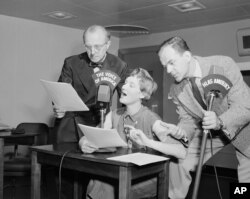A little more than seven weeks after the United States officially entered World War II, a live, 15-minute shortwave radio broadcast was transmitted into Germany from a small studio in New York City on February 1, 1942.
It was introduced by the American patriotic song "The Battle Hymn of the Republic." Then, announcer William Harlan Hale's voice could be heard saying: “We bring you Voices from America. Today, and daily from now on, we shall speak to you about America and the war. The news may be good for us. The news may be bad. But we shall tell you the truth.”
That was the very first broadcast from what, 75 years later, is now the Washington-headquartered Voice of America.
By the end of the war, VOA was broadcasting in 40 languages, with programming consisting of music, news and commentary.
Since then, VOA has grown into a multimedia international broadcasting service, with programming and content in 47 languages on multiple platforms, including radio, television and mobile.
On that first broadcast, announcer Hale's words set the standard for future programs.
And since 1976, his words have carried the weight of the VOA Charter, which by law requires VOA to “serve as a consistently reliable and authoritative source of news.” What’s more, it says VOA news must “be accurate, objective and comprehensive.”
“It’s been 75 years since we first began broadcasting objective news and information around the world,” said VOA Director Amanda Bennett. “And now, I think what we do here is more important than ever.”
Over the years, VOA correspondents and freelance reporters in many parts of the world have been on the scene to cover major world events.
In 1989, VOA East European correspondent Jolyon Naegele reported on demonstrations in Czechoslovakia and the fall of the communist government. Later that year, on the other side of the world, VOA increased programming and added staff to its Beijing bureau to cover the student-led demonstrations in Tiananmen Square. Beijing Bureau chief Al Pessin was expelled from China for his reporting.
Today, VOA broadcasts news and other programming through 2,500 television and radio affiliates around the world. At the same time, it provides content for mobile devices and interacts with audiences through social media.
As of 2016, VOA's weekly audience across all platforms averaged more than 236 million people worldwide.





